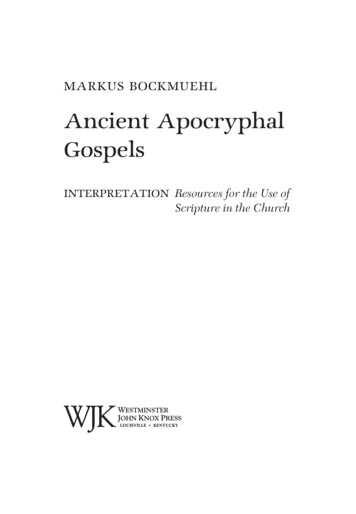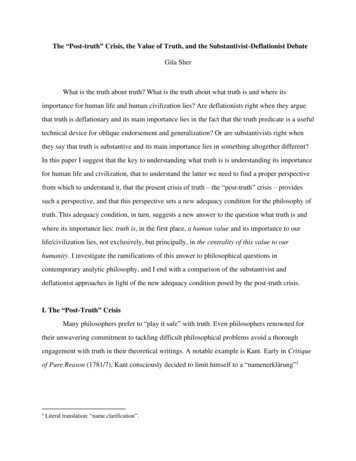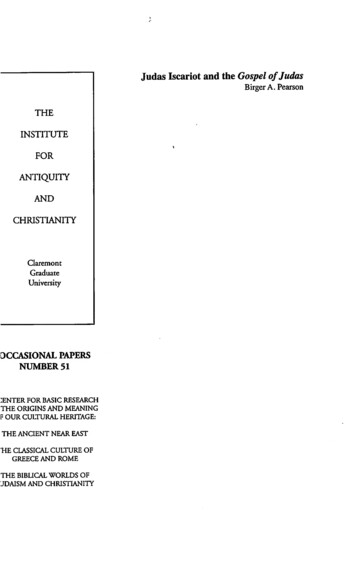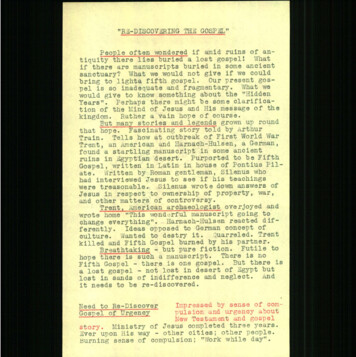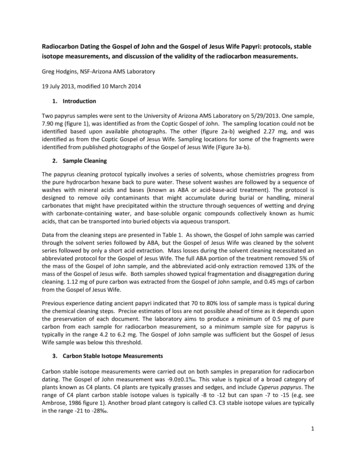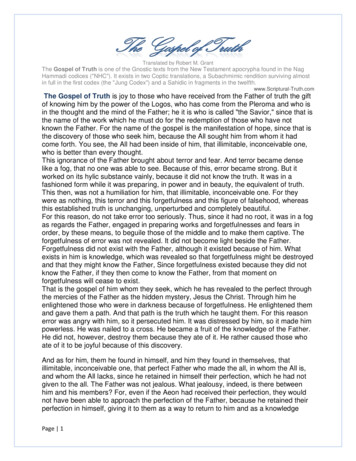
Transcription
The Gospel of TruthTranslated by Robert M. GrantThe Gospel of Truth is one of the Gnostic texts from the New Testament apocrypha found in the NagHammadi codices ("NHC"). It exists in two Coptic translations, a Subachmimic rendition surviving almostin full in the first codex (the "Jung Codex") and a Sahidic in fragments in the twelfth.www.Scriptural-Truth.comThe Gospel of Truth is joy to those who have received from the Father of truth the giftof knowing him by the power of the Logos, who has come from the Pleroma and who isin the thought and the mind of the Father; he it is who is called "the Savior," since that isthe name of the work which he must do for the redemption of those who have notknown the Father. For the name of the gospel is the manifestation of hope, since that isthe discovery of those who seek him, because the All sought him from whom it hadcome forth. You see, the All had been inside of him, that illimitable, inconceivable one,who is better than every thought.This ignorance of the Father brought about terror and fear. And terror became denselike a fog, that no one was able to see. Because of this, error became strong. But itworked on its hylic substance vainly, because it did not know the truth. It was in afashioned form while it was preparing, in power and in beauty, the equivalent of truth.This then, was not a humiliation for him, that illimitable, inconceivable one. For theywere as nothing, this terror and this forgetfulness and this figure of falsehood, whereasthis established truth is unchanging, unperturbed and completely beautiful.For this reason, do not take error too seriously. Thus, since it had no root, it was in a fogas regards the Father, engaged in preparing works and forgetfulnesses and fears inorder, by these means, to beguile those of the middle and to make them captive. Theforgetfulness of error was not revealed. It did not become light beside the Father.Forgetfulness did not exist with the Father, although it existed because of him. Whatexists in him is knowledge, which was revealed so that forgetfulness might be destroyedand that they might know the Father, Since forgetfulness existed because they did notknow the Father, if they then come to know the Father, from that moment onforgetfulness will cease to exist.That is the gospel of him whom they seek, which he has revealed to the perfect throughthe mercies of the Father as the hidden mystery, Jesus the Christ. Through him heenlightened those who were in darkness because of forgetfulness. He enlightened themand gave them a path. And that path is the truth which he taught them. For this reasonerror was angry with him, so it persecuted him. It was distressed by him, so it made himpowerless. He was nailed to a cross. He became a fruit of the knowledge of the Father.He did not, however, destroy them because they ate of it. He rather caused those whoate of it to be joyful because of this discovery.And as for him, them he found in himself, and him they found in themselves, thatillimitable, inconceivable one, that perfect Father who made the all, in whom the All is,and whom the All lacks, since he retained in himself their perfection, which he had notgiven to the all. The Father was not jealous. What jealousy, indeed, is there betweenhim and his members? For, even if the Aeon had received their perfection, they wouldnot have been able to approach the perfection of the Father, because he retained theirperfection in himself, giving it to them as a way to return to him and as a knowledgePage 1
unique in perfection. He is the one who set the All in order and in whom the All existedand whom the All lacked. As one of whom some have no knowledge, he desires thatthey know him and that they love him. For what is it that the All lacked, if not theknowledge of the Father?He became a guide, quiet and in leisure. In the middle of a school he came and spokethe Word, as a teacher. Those who were wise in their own estimation came to put himto the test. But he discredited them as empty-headed people. They hated him becausethey really were not wise men. After all these came also the little children, those whopossess the knowledge of the Father. When they became strong they were taught theaspects of the Father's face. They came to know and they were known. They wereglorified and they gave glory. In their heart, the living book of the Living was manifest,the book which was written in the thought and in the mind of the Father and, from beforethe foundation of the All, is in that incomprehensible part of him.This is the book which no one found possible to take, since it was reserved for him whowill take it and be slain. No one was able to be manifest from those who believed insalvation as long as that book had not appeared. For this reason, the compassionate,faithful Jesus was patient in his sufferings until he took that book, since he knew that hisdeath meant life for many. Just as in the case of a will which has not yet been opened,for the fortune of the deceased master of the house is hidden, so also in the case of theAll which had been hidden as long as the Father of the All was invisible and unique inhimself, in whom every space has its source. For this reason Jesus appeared. He tookthat book as his own. He was nailed to a cross. He affixed the edict of the Father to thecross.Oh, such great teaching! He abases himself even unto death, though he is clothed ineternal life. Having divested himself of these perishable rags, he clothed himself inincorruptibility, which no one could possibly take from him. Having entered into theempty territory of fears, he passed before those who were stripped by forgetfulness,being both knowledge and perfection, proclaiming the things that are in the heart of theFather, so that he became the wisdom of those who have received instruction. Butthose who are to be taught, the living who are inscribed in the book of the living, learnfor themselves, receiving instructions from the Father, turning to him again.Since the perfection of the All is in the Father, it is necessary for the All to ascend tohim. Therefore, if one has knowledge, he gets what belongs to him and draws it tohimself. For he who is ignorant, is deficient, and it is a great deficiency, since he lacksthat which will make him perfect. Since the perfection of the All is in the Father, it isnecessary for the All to ascend to him and for each one to get the things which are his.He registered them first, having prepared them to be given to those who came from him.Those whose name he knew first were called last, so that the one who has knowledgeis he whose name the Father has pronounced. For he whose name has not beenspoken is ignorant. Indeed, how shall one hear if his name has not been uttered? For hewho remains ignorant until the end is a creature of forgetfulness and will perish with it. Ifthis is not so, why have these wretches no name, why do they have no sound? Hence,if one has knowledge, he is from above. If he is called, he hears, he replies, and heturns toward him who called him and he ascends to him and he knows what he iscalled. Since he has knowledge, he does the will of him who called him. He desires toplease him and he finds rest. He receives a certain name. He who thus is going to haveknowledge knows whence he came and whither he is going. He knows it as a personPage 2
who, having become intoxicated, has turned from his drunkenness and having come tohimself, has restored what is his own.He has turned many from error. He went before them to their own places, from whichthey departed when they erred because of the depth of him who surrounds every place,whereas there is nothing which surrounds him. It was a great wonder that they were inthe Father without knowing him and that they were able to leave on their own, sincethey were not able to contain him and know him in whom they were, for indeed his willhad not come forth from him. For he revealed it as a knowledge with which all itsemanations agree, namely, the knowledge of the living book which he revealed to theAeons at last as his letters, displaying to them that these are not merely vowels norconsonants, so that one may read them and think of something void of meaning; on thecontrary, they are letters which convey the truth. They are pronounced only when theyare known. Each letter is a perfect truth like a perfect book, for they are letters written bythe hand of the unity, since the Father wrote them for the Aeons, so that they by meansof his letters might come to know the Father.While his wisdom mediates on the logos, and since his teaching expresses it, hisknowledge has been revealed. His honor is a crown upon it. Since his joy agrees with it,his glory exalted it. It has revealed his image. It has obtained his rest. His love tookbodily form around it. His trust embraced it. Thus the logos of the Father goes forth intothe All, being the fruit of his heart and expression of his will. It supports the All. Itchooses and also takes the form of the All, purifying it, and causing it to return to theFather and to the Mother, Jesus of the utmost sweetness. The Father opens his bosom,but his bosom is the Holy Spirit. He reveals his hidden self which is his son, so thatthrough the compassion of the Father the Aeons may know him, end their wearyingsearch for the Father and rest themselves in him, knowing that this is rest. After he hadfilled what was incomplete, he did away with form. The form of it is the world, that whichit served. For where there is envy and strife, there is an incompleteness; but wherethere is unity, there is completeness. Since this incompleteness came about becausethey did not know the Father, so when they know the Father, incompleteness, from thatmoment on, will cease to exist. As one's ignorance disappears when he gainsknowledge, and as darkness disappears when light appears, so also incompleteness iseliminated by completeness. Certainly, from that moment on, form is no longer manifest,but will be dissolved in fusion with unity. For now their works lie scattered. In time unitywill make the spaces complete. By means of unity each one will understand itself. Bymeans of knowledge it will purify itself of diversity with a view towards unity, devouringmatter within itself like fire and darkness by light, death by life.Certainly, if these things have happened to each one of us, it is fitting for us, surely, tothink about the All so that the house may be holy and silent for unity. Like people whohave moved from a neighborhood, if they have some dishes around which are not good,they usually break them. Nevertheless the householder does not suffer a loss, butrejoices, for in the place of these defective dishes there are those which are completelyperfect. For this is the judgement which has come from above and which has judgedevery person, a drawn two-edged sword cutting on this side and that. When it appeared,I mean, the Logos, who is in the heart of those who pronounce it - it was not merely asound but it has become a body - a great disturbance occurred among the dishes, forsome were emptied, others filled: some were provided for, others were removed; somewere purified, still others were broken. All the spaces were shaken and disturbed forPage 3
they had no composure nor stability. Error was disturbed not knowing what it should do.It was troubled; it lamented, it was beside itself because it did not know anything. Whenknowledge, which is its abolishment, approached it with all its emanations, error isempty, since there is nothing in it. Truth appeared; all its emanations recognized it. Theyactually greeted the Father with a power which is complete and which joins them withthe Father. For each one loves truth because truth is the mouth of the Father. Histongue is the Holy Spirit, who joins him to truth attaching him to the mouth of the Fatherby his tongue at the time he shall receive the Holy Spirit.This is the manifestation of the Father and his revelation to his Aeons. He revealed hishidden self and explained it. For who is it who exists if it is not the Father himself? Allthe spaces are his emanations. They knew that they stem from him as children from aperfect man. They knew that they had not yet received form nor had they yet received aname, every one of which the Father produces. If they at that time receive form of hisknowledge, though they are truly in him, they do not know him. But the Father is perfect.He knows every space which is within him. If he pleases, he reveals anyone whom hedesires by giving him a form and by giving him a name; and he does give him a nameand cause him to come into being. Those who do not yet exist are ignorant of him whocreated them. I do not say, then, that those who do not yet exist are nothing. But theyare in him who will desire that they exist when he pleases, like the event which is goingto happen. On the one hand, he knows, before anything is revealed, what he willproduce. On the other hand, the fruit which has not yet been revealed does not knowanything, nor is it anything either. Thus each space which, on its part, is in the Fathercomes from the existent one, who, on his part, has established it from the nonexistent.[.] he who does not exist at all, will never exist.What, then, is that which he wants him to think? "I am like the shadows and phantomsof the night." When morning comes, this one knows that the fear which he hadexperienced was nothing. Thus they were ignorant of the Father; he is the one whomthey did not see. Since there had been fear and confusion and a lack of confidence anddoublemindness and division, there were many illusions which were conceived by him,the foregoing, as well as empty ignorance - as if they were fast asleep and foundthemselves a prey to troubled dreams. Either there is a place to which they flee, or theylack strength as they come, having pursued unspecified things. Either they are involvedin inflicting blows, or they themselves receive bruises. Either they are falling from highplaces, or they fly off through the air, though they have no wings at all. Other times, it isas if certain people were trying to kill them, even though there is no one pursuing them;or, they themselves are killing those beside them, for they are stained by their blood.Until the moment when they who are passing through all these things - I mean they whohave experienced all these confusions - awake, they see nothing because the dreamswere nothing. It is thus that they who cast ignorance from them as sheep do notconsider it to be anything, nor regard its properties to be something real, but theyrenounce them like a dream in the night and they consider the knowledge of the Fatherto be the dawn. It is thus that each one has acted, as if he were asleep, during the timewhen he was ignorant and thus he comes to understand, as if he were awakening. Andhappy is the man who comes to himself and awakens. Indeed, blessed is he who hasopened the eyes of the blind.And the Spirit came to him in haste when it raised him. Having given its hand to the onelying prone on the ground, it placed him firmly on his feet, for he had not yet stood up.Page 4
He gave them the means of knowing the knowledge of the Father and the revelation ofhis son. For when they saw it and listened to it, he permitted them to take a taste of andto smell and to grasp the beloved son.He appeared, informing them of the Father, the illimitable one. He inspired them withthat which is in the mind, while doing his will. Many received the light and turnedtowards him. But material men were alien to him and did not discern his appearance norrecognize him. For he came in the likeness of flesh and nothing blocked his waybecause it was incorruptible and unrestrainable. Moreover, while saying new things,speaking about what is in the heart of the Father, he proclaimed the faultless word.Light spoke through his mouth, and his voice brought forth life. He gave them thoughtand understanding and mercy and salvation and the Spirit of strength derived from thelimitlessness of the Father and sweetness. He caused punishments and scourgings tocease, for it was they which caused many in need of mercy to astray from him in errorand in chains - and he mightily destroyed them and derided them with knowledge. Hebecame a path for those who went astray and knowledge to those who were ignorant, adiscovery for those who sought, and a support for those who tremble, a purity for thosewho were defiled.He is the shepherd who left behind the ninety-nine sheep which had not strayed andwent in search of that one which was lost. He rejoiced when he had found it. Forninetynineis a number of the left hand, which holds it. The moment he finds the one,however, the whole number is transferred to the right hand. Thus it is with him wholacks the one, that is, the entire right hand which attracts that in which it is deficient,seizes it from the left side and transfers it to the right. In this way, then, the numberbecomes one hundred. This number signifies the Father.He labored even on the Sabbath for the sheep which he found fallen into the pit. Hesaved the life of that sheep, bringing it up from the pit in order that you may understandfully what that Sabbath is, you who possess full understanding. It is a day in which it isnot fitting that salvation be idle, so that you may speak of that heavenly day which hasno night and of the sun which does not set because it is perfect. Say then in your heartthat you are this perfect day and that in you the light which does not fail dwells.Speak concerning the truth to those who seek it and of knowledge to those who, in theirerror, have committed sin. Make sure-footed those who stumble and stretch forth yourhands to the sick. Nourish the hungry and set at ease those who are troubled. Fostermen who love. Raise up and awaken those who sleep. For you are this understandingwhich encourages. If the strong follow this course, they are even stronger. Turn yourattention to yourselves. Do not be concerned with other things, namely, that which youhave cast forth from yourselves, that which you have dismissed. Do not return to themto eat them. Do not be moth-eaten. Do not be worm-eaten, for you have already shakenit off. Do not be a place of the devil, for you have already destroyed him. Do notstrengthen your last obstacles, because that is reprehensible. For the lawless one isnothing. He harms himself more than the law. For that one does his works because heis a lawless person. But this one, because he is a righteous person, does his worksamong others. Do the will of the Father, then, for you are from him.For the Father is sweet and his will is good. He knows the things that are yours, so thatyou may rest yourselves in them. For by the fruits one knows the things that are yours,that they are the children of the Father, and one knows his aroma, that you originatePage 5
from the grace of his countenance. For this reason, the Father loved his aroma; and itmanifests itself in every place; and when it is mixed with matter, he gives his aroma tothe light; and into his rest he causes it to ascend in every form and in every sound. Forthere are no nostrils which smell the aroma, but it is the Spirit which possesses thesense of smell and it draws it for itself to itself and sinks into the aroma of the Father.He is, indeed, the place for it, and he takes it to the place from which it has come, in thefirst aroma which is cold. It is something in a psychic form, resembling cold water whichis [.] since it is in soil which is not hard, of which those who see it think, "It is earth."Afterwards, it becomes soft again. If a breath is taken, it is usually hot. The cold aromas,then, are from the division. For this reason, God came and destroyed the division andhe brought the hot Pleroma of love, so that the cold may not return, but the unity of thePerfect Thought prevail.This is the word of the Gospel of the finding of the Pleroma for those who wait for thesalvation which comes from above. When their hope, for which they are waiting, iswaiting - they whose likeness is the light in which there is no shadow, then at that timethe Pleroma is about to come. The deficiency of matter, however, is not because of thelimitlessness of the Father who comes at the time of the deficiency. And yet no one isable to say that the incorruptible One will come in this manner. But the depth of theFather is increasing, and the thought of error is not with him. It is a matter of fallingdown and a matter of being readily set upright at the finding of that one who has cometo him who will turn back.For this turning back is called "repentance". For this reason, incorruption has breathed.It followed him who has sinned in order that he may find rest. For forgiveness is thatwhich remains for the light in the deficiency, the word of the pleroma. For the physicianhurries to the place in which there is sickness, because that is the desire which he has.The sick man is in a deficient condition, but he does not hide himself because thephysician possesses that which he lacks. In this manner the deficiency is filled by thePleroma, which has no deficiency, which has given itself out in order to fill the one whois deficient, so that grace may take him, then, from the area which is deficient and hasno grace. Because of this a diminishing occurred in the place which there is no grace,the area where the one who is small, who is deficient, is taken hold of.He revealed himself as a Pleroma, i.e., the finding of the light of truth which has shinedtowards him, because he is unchangeable. For this reason, they who have beentroubled speak about Christ in their midst so that they may receive a return and he mayanoint them with the ointment. The ointment is the pity of the Father, who will havemercy on them. But those whom he has anointed are those who are perfect. For thefilled vessels are those which are customarily used for anointing. But when an anointingis finished, the vessel is usually empty, and the cause of its deficiency is theconsumption of its ointment. For then a breath is drawn only through the power whichhe has. But the one who is without deficiency - one does not trust anyone beside himnor does one pour anything out. But that which is the deficient is filled again by theperfect Father. He is good. He knows his plantings because he is the one who hasplanted them in his Paradise. And his Paradise is his place of rest.This is the perfection in the thought of the Father and these are the words of hisreflection. Each one of his words is the work of his will alone, in the revelation of hisLogos. Since they were in the depth of his mind, the Logos, who was the first to comeforth, caused them to appear, along with an intellect which speaks the unique word byPage 6
means of a silent grace. It was called "thought," since they were in it before becomingmanifest. It happened, then, that it was the first to come forth - at the moment pleasingto the will of him who desired it; and it is in the will that the Father is at rest and withwhich he is pleased. Nothing happens without him, nor does anything occur without thewill of the Father. But his will is incomprehensible. His will is his mark, but no one canknow it, nor is it possible for them to concentrate on it in order to possess it. But thatwhich he wishes takes place at the moment he wishes it - even if the view does notplease anyone: it is God s will. For the Father knows the beginning of them all as wellas their end. For when their end arrives, he will question them to their faces. The end,you see, is the recognition of him who is hidden, that is, the Father, from whom thebeginning came forth and to whom will return all who have come from him. For theywere made manifest for the glory and the joy of his name.And the name of the Father is the Son. It is he who, in the beginning, gave a name tohim who came forth from him - he is the same one - and he begat him for a son. Hegave him his name which belonged to him - he, the Father, who possesses everythingwhich exists around him. He possess the name; he has the son. It is possible for themto see him. The name, however, is invisible, for it alone is the mystery of the invisibleabout to come to ears completely filled with it through the Father s agency. Moreover,as for the Father, his name is not pronounced, but it is revealed through a son. Thus,then, the name is great.Who, then, has been able to pronounce a name for him, this great name, except himalone to whom the name belongs and the sons of the name in whom the name of theFather is at rest, and who themselves in turn are at rest in his name, since the Fatherhas no beginning? It is he alone who engendered it for himself as a name in thebeginning before he had created the Aeons, that the name of the Father should be overtheir heads as a lord - that is, the real name, which is secure by his authority and by hisperfect power. For the name is not drawn from lexicons nor is his name derived fromcommon name-giving, But it is invisible. He gave a name to himself alone, because healone saw it and because he alone was capable of giving himself a name. For he whodoes not exist has no name. For what name would one give him who did not exist?Nevertheless, he who exists also with his name and he alone knows it, and to him alonethe Father gave a name. The Son is his name. He did not, therefore, keep it secretlyhidden, but the son came into existence. He himself gave a name to him. The name,then, is that of the Father, just as the name of the Father is the Son. For otherwise,where would compassion find a name - outside of the Father? But someone willprobably say to his companion, "Who would give a name to someone who existedbefore himself, as if, indeed, children did not receive their name from one of those whogave them birth?"Above all, then, it is fitting for us to think this point over: What is the name? It is the realname. It is, indeed, the name which came from the Father, for it is he who owns thename. He did not, you see, get the name on loan, as in the case of others because ofthe form in which each one of them is going to be created. This, then, is theauthoritative name. There is no one else to whom he has given it. But it remainedunnamed, unuttered, till the moment when he, who is perfect, pronounced it himself;and it was he alone who was able to pronounce his name and to see it. When it pleasedhim, then, that his son should be his pronounced name and when he gave this name tohim, he who has come from the depth spoke of his secrets, because he knew that thePage 7
Father was absolute goodness. For this reason, indeed, he sent this particular one inorder that he might speak concerning the place and his place of rest from which he hadcome forth, and that he might glorify the Pleroma, the greatness of his name and thesweetness of his Father.Each one will speak concerning the place from which he has come forth, and to theregion from which he received his essential being, he will hasten to return once again.And he want from that place - the place where he was - because he tasted of that place,as he was nourished and grew. And his own place of rest is his Pleroma. All theemanations from the Father, therefore, are Pleromas, and all his emanations have theirroots in the one who caused them all to grow from himself. He appointed a limit. They,then, became manifest individually in order that they might be in their own thought, forthat place to which they extend their thoughts is their root, which lifts them upwardthrough all heights to the Father. They reach his head, which is rest for them, and theyremain there near to it so that they say that they have participated in his face by meansof embraces. But these of this kind were not manifest, because they have not risenabove themselves. Neither have they been deprived of the glory of the Father nor havethey thought of him as small, nor bitter, nor angry, but as absolutely good, unperturbed,sweet, knowing all the spaces before they came into existence and having no need ofinstruction. Such are they who possess from above something of this immeasurablegreatness, as they strain towards that unique and perfect one who exists there for them.And they do not go down to Hades. They have neither envy nor moaning, nor is death inthem. But they rest in him who rests, without wearying themselves or becoming involvedin the search for truth. But, they, indeed, are the truth, and the Father is in them, andthey are in the Father, since they are perfect, inseparable from him who is truly good.They lack nothing in any way, but they are given rest and are refreshed by the Spirit.And they listen to their root; they have leisure for themselves, they in whom he will findhis root, and he will suffer no loss to his soul.Such is the place of the blessed; this is their place. As for the rest, then, may they know,in their place, that it does not suit me, after having been in the place of rest to sayanything more. But he is the one in whom I shall be in order to devote myself, at alltimes, to the Father of the All and the true brothers, those upon whom the love of theFather is lavished, and in whose midst nothing of him is lacking. It is they who manifestthemselves truly since they are in that true and eternal life and speak of the perfect lightfilled with the seed of the Father, and which is in his heart and in the Pleroma, while hisSpirit rejoices in it and glorifies him in whom it was, because the Father is good. And hischildren are perfect and worthy of his name, because he is the Father. Children of thiskind are those whom he loves.ENDThe Gospel of Truth (140-180AD)The Gospel of Truth was discovered alongside other Gnostic texts in theNag Hammadi Library in Egypt (in 1945). Scholars have dated it to the 2ndcentury and have connected it with an early Gnostic teacher namedVa
The Gospel of Truth Translated by Robert M. Grant The Gospel of Truth is one of the Gnostic texts from the New Testament apocrypha found in the Nag Hammadi codices ("NHC"). It exists in two Coptic translations, a Subachmimic rendition surviving almost in full in the first codex (the "Jung Codex") and a Sahidic in fragments in the twelfth.


